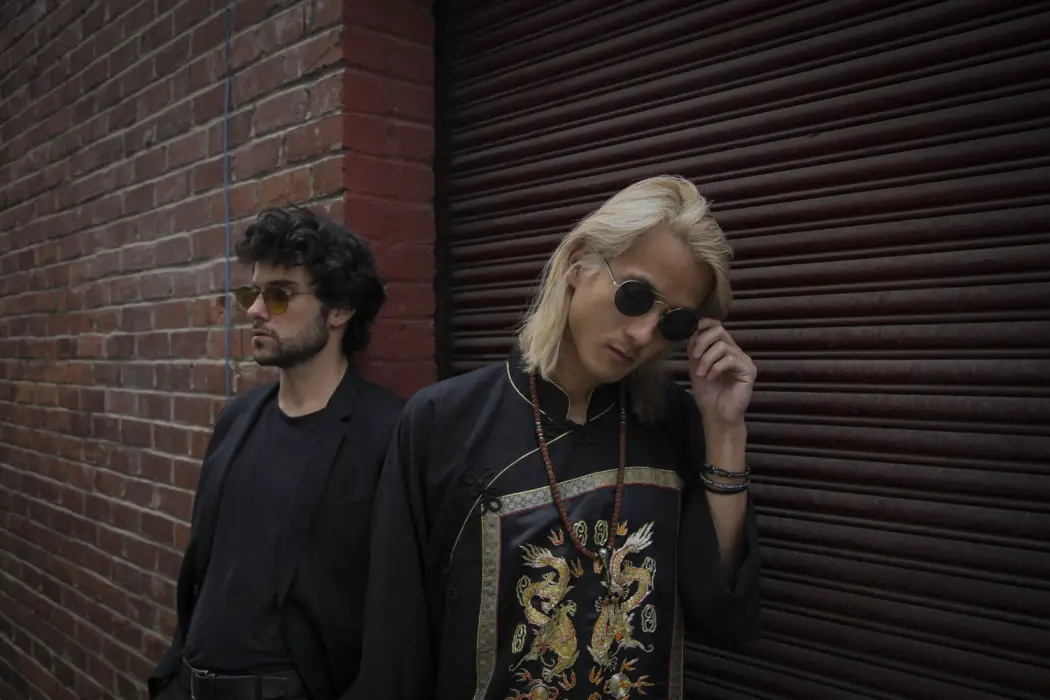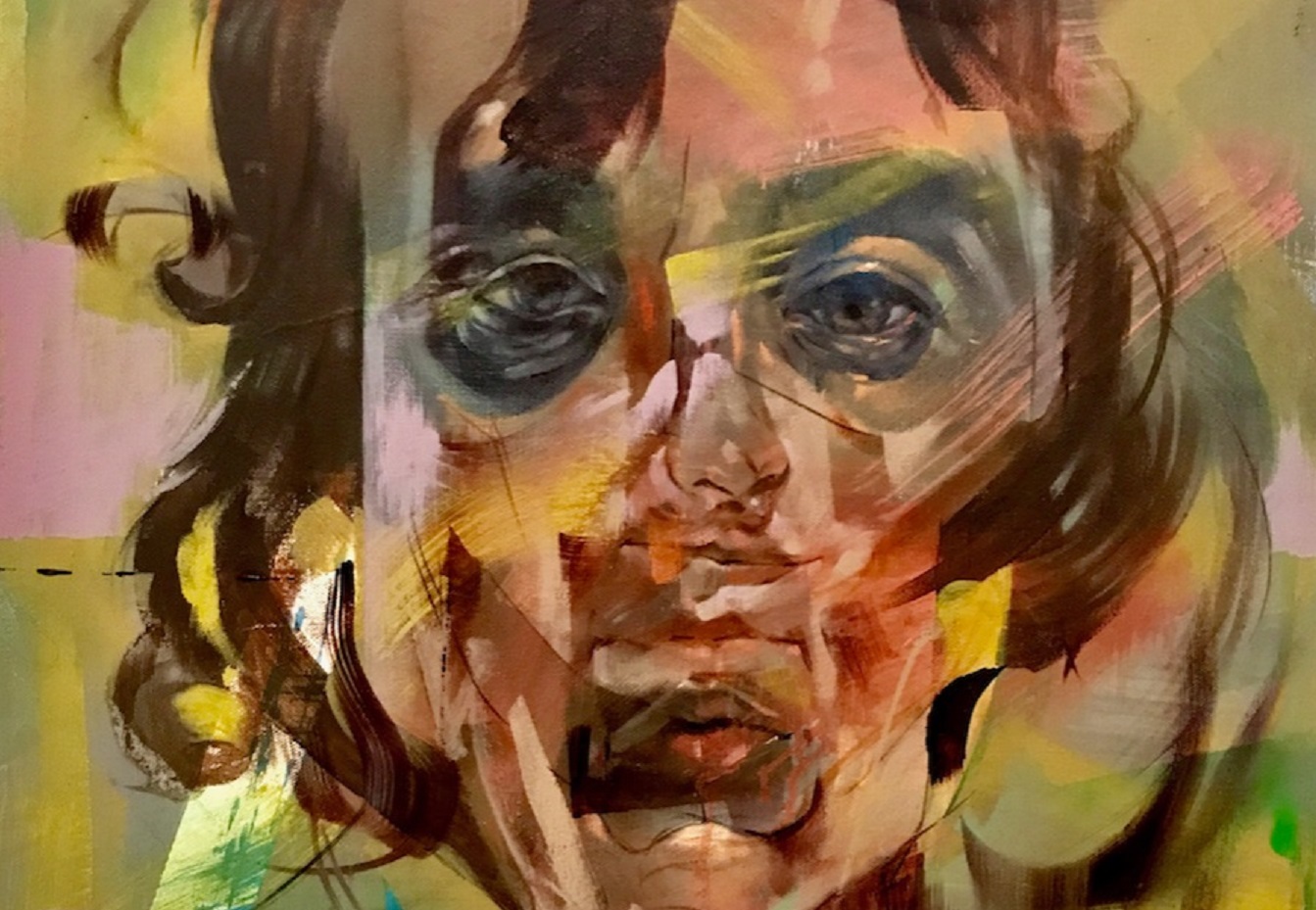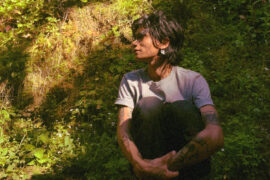Atwood Magazine talks to Diplomacy about their friendship, the band’s inception, debut “Silver Lake Queen”, and how Diplomacy brought them out of their comfort zones.
— —
The board game Diplomacy requires tactful moves, concentration, negotiation, and, at times, partnership. It’s a game where one can’t just do things halfway, as soon as you decide to play you’re all in, consumed by wherever the game’s story will take you that day. World domination is the goal, you just have to figure out a way to get there.
It was during several Diplomacy game nights that Tim Wu, also known as his solo musical alias ELEPHANTE, and Jack Falahee, one of the stars of ABC’s hit show How to Get Away With Murder, decided to take a stab at starting a band together. The childhood best friends decided to bring together their different backgrounds and artistic skills and, tactfully, collaborate to form the duo called Diplomacy, which today releases their first single “Silver Lake Queen”.

Much like when playing the eponymous board game, Wu and Falahee had to negotiate their way into songwriting, with Wu adapting to a different and more relaxed way to write songs and Falahee learning how to be comfortable with songwriting and becoming a musician. They compare themselves to Yoda and Luke Skywalker – mentor and mentee, collaborators, both with a lot to gain from working together.
Debut single “Silver Lake Queen” is an irresistible confection. High energy and confident, the single guides you through delicious electric guitar riffs and Falahee’s impressive vocals to tell the story of a strong woman. Call it Diplomacy’s version of The Velvet Underground’s “Femme Fatale”. The music video is similarly as striking, with Sadie Yarrington enchanting the viewers as she moves around the screen in a red dress, embodying the allure and seductive elusiveness of the royal character at the centre of the story.
“Silver Lake Queen” is just the first of many stories Diplomacy will tell in the near future. With an EP scheduled for release in early 2020, the band is determined to turn stories into song, crafting sonic moments that are sure to keep you in the game, on their side. Atwood Magazine talked to Diplomacy about their friendship, the band’s inception, debut single and video “Silver Lake Queen”, and how Diplomacy brought them out of their comfort zones.
Listen: “Silver Lake Queen” – Diplomacy
Atwood Magazine: So I think I wanted to start off asking, I‘ve been seeing you post about each other for a long time, and I know that you‘ve been friends for years. Why was now the right time for you guys to start a band and like actually go into something artistic together?
Tim Wu: Yeah, I think, it’s actually been a process. You know, we’re all kind of rolling this out now but it’s been something that’s sort of been simmering up and bubbling up for a few years at least. You know, we really wanted to get everything right and really make sure we came out of the gate, super strong with a lot of really cool content. And, you know, it was definitely a battle to sort of, you know, in this day and age as there’s always this rush to try to get things out and get the validation, and you feel like you’re left behind, but we wanted to go the other way and really make it feel like a coherent, well thought-out project. I mean, I was at a point, and I think Jack similarly, we had sort of gotten a foothold in our respective industries and we’re in a lot of ways frustrated about certain elements of it. And it was just like a cool idea where it was another outlet to sort of get back to that childhood dream of like, just making cool shit with your friends and then making something special. So the stars just sort of aligned.
Had you guys try to do anything together before?
Jack Falahee: Yeah, I mean, we’d tried to play board games together. We’re actually somewhat designing a board game together right now. Tim’s really designing it, I’m sort of just championing it. But that is tangential but also relevant because the name Diplomacy – the genesis of the names Diplomacy is from these, like weekly board game nights that we would have as sort of check-ins with each other, just to see how one another were doing in the craziness of Hollywood and in pursuit of our respective careers. And so we’d always talked about collaborating on something and, you know, I made a short film a couple years ago that Tim starred in –
Tim Wu: I had a very big role in it.
Jack Falahee: He was essentially cut out which, which created a little strife in our friendship, but I also starred in one of the early ELEPHANTE music videos. So we’ve always been collaborating with one another to some extent, but this was just like, the logical next step and something that we had talked about for a long time. Originally it started as doing a sort of EDM project together, and then just going back to our, our roots in Michigan and the music that we grew up listening to and both were raised on and enjoy, we found the sound that diplomacy now embodies.
That‘s a perfect segue into my next question, Jack. Thank you.
Jack Falahee: Nailed it.
On your Instagram post you said that you did look into the artists that you liked growing up to find the sound for Diplomacy. Could each of you tell me who these artists were?
Tim Wu: Yeah, I mean, for me, it was a lot of indie, alt rock. You know, we kept referencing The Killers a lot. That was a big one for me. Red Hot Chili Peppers. I’m also trying to incorporate some of the more modern electronic elements that I’ve been developing as ELEPHANTE.
Jack Falahee: Yeah, definitely. Definitely Red Hot Chili Peppers. I mean, we grew up going to Red Hot Chili Peppers concerts in Detroit. And I think I also really related to, in some ways, Anthony Kiedis’ is journey becoming a musician. I read Scar Tissue when I moved to LA and just hearing him talk about how he didn’t really consider himself a musician until he started making music with some of his friends and I certainly never considered myself a musician until I got into the studio with Tim and you know, with Tim’s help, found my voice and our writing style and sort of grabbing things from my personal life, Tim’s personal life, our collective experience in Hollywood, much like Red Hot Chili Peppers has done. And then like Tim said, I think we were inspired by like, seeing shows in LA, going to Coachella seeing Flume play, Chet Faker.
Tim Wu: What Jack’s trying to say is that he’s Luke Skywalker and I’m Yoda.
Jack Falahee: Exactly.

So Jack this was your first attempt at music, at least publicly. And you‘ve been an actor for so long, what made you want to try another art form?
Jack Falahee: Well, out of high school Tim and I went different paths. I actually went to New York University for musical theatre, so originally, I thought that I was going to be sort of a Broadway actor and do the whole song and dance, literally. But once I got to New York and sort of was in over my head and couldn’t really keep up with these kids that had been, you know, dancing for 15 years of their lives and taking vocal coaching just as long and piano and all these things, so I sort of transitioned then into what they refer to as straight acting. So music always been a part of my life. I mean, from a young age, I was in, you know, church choirs and played violin at church and all that. But yeah, publicly I haven’t really pursued much. And I’ve always sort of envied Tim from afar, especially with, you know, how Tim is definitely trying to, with ELEPHANTE, disrupt the music space and sort of do it on his own terms without a label. And I, as an actor, have a very different experience of showing up on a set and, you know, I basically read someone else’s script that they’ve written and then I’m directed by another person, and then another person or persons is editing together my performance and there’s not a whole lot of autonomy in acting on screen. And so being this the free agent and just putting my voice entirely behind a project was really appealing to me and I think that sort of was the catalyst for the career in music, was being able to put our voices in something and and just have it be our own entirely.
And Tim, you obviously have your own solo music project which is ELEPHANTE, how do you think that Diplomacy differs from it or like explores a different side of you than ELEPHANTE does?
Tim Wu: Yeah, totally. It’s been an awesome to creative experience. I love dance music, I love electronic music, but that’s not the whole of my creative identity. I grew up singer-songwriter, and I was in bands, I was playing open mics, all long before I was producing electronic music so there’s always been that side of me. And so Diplomacy was number one an opportunity to kind of explore sounds and ideas and slower songs and more vibey things that wouldn’t necessarily work as just a pure dance track. So that was cool and really creatively refreshing for me to sort of just dig into some other parts and sounds and songs that I was really interested in but didn’t necessarily fit the format of ELEPHANTE. But also just working with Jack, you know, collaborating on the songwriting and kind of creating this identity together was a really fresh experience for me because with ELEPHANTE stuff, you know, at the end of the day, it was my call on everything that happened, right? I answered pretty much no one and I could pretty much do whatever I wanted. But then at first it was actually hard for me, because I’m used to being like “No, no, no, this is how it is. That’s it, that’s that”. I had to let go of the wheel a little bit and trust someone else’s creative vision. And our process, Jack, he keeps these really incredible diaries which I felt pretty honoured that he let me read some of them just when were kind of trying to figure out Diplomacy and so it almost became this incredible source material for me to get outside my own head. You know, as a songwriter, you often can fall into patterns and kind of tread the same ground, but then getting all this new material and working with Jack was really like, “Okay, well, we’re starting from a completely different place that I’m used to”. It feels like a completely new experience.
Diving into your songwriting a little more, can you describe to me what your first studio or writing session was ? How did the friendship dynamic translate into the songwriting dynamic?
Tim Wu: Like, it was definitely a feeling out process, right? Because like I said, I’m used to doing things in a very specific way. And it was, you know, when I work with writers, a lot of the times it’s like, sort of me giving marching orders and being kind of an autocrat about it. The first few times it was like, we tried to go through the process I’m used to, like, “Hey, here’s the song, here’s the chord pattern or whatever, here’s the melody, alright Jack sing it”. And it was like, Jack’s a great singer, but I wasn’t doing a good job making it connect with him, even little things like, just some sort of language you use, like, because I think in a very sort of technical music fashion, and, you know, a lot of that wasn’t connecting on a deep level. And so over time, like I mentioned, Jack shared his diary with me and so we started to write songs, like from a shared place instead of me just handing him lyrics and just communicating in different ways. So, one thing that we sort of found is we started talking in sort of emotional and almost like acting terms. Like, it started as a joke where I was like “Just act” and then he did it and it was fucking amazing and then we talked very little about “Hit this note”, it’s always just like “Alright, this is the story we’re trying to tell this is like, the sort of emotional starting point of it” and we use like acting language and storytelling language. It manifests itself in sort of the musical ways that I used to think about things. I was very stuck in my ways, we both had to kind of go outside our comfort zone to find the middle ground and find that connected and shared experience.
And Jack, how comfortable were you with songwriting before you started writing together?
Jack Falahee: I mean, I’m still not comfortable with songwriting. I don’t know. I had never really attempted songwriting. I mean, I grew up in a very musical household, my dad’s like an incredible bluegrass musician, so he would always play original stuff growing up. So I was always around it and was always more of a writer than a musician. So that’s, I think, sort of what Tim honed in on, he knew that the asset that I’d be able to bring to the songwriting process was storytelling. So when he first sort of looked over my diaries, he could see, you know, there is this prose that I’d write in that could, you know, with a little bit of massaging, be a song. But actually in the beginning it wasn’t really about me trying to write a song it was just about telling a story and you know, now that the EP is done I’m trying to write songs a little bit more on my own just to bring something to the table so that you know, we keep it energetic and fresh and both are bringing things to recording sessions. But it’s definitely a learning curve and I’m still getting the hang of it. But I have an okay tutor, he’s alright (laughs).
Tim Wu: Oh, I am Yoda. Just add to that, Jack’s a very gifted songwriter. To me it’s been less about teaching him more just about like, you know, focusing in on certain aspects. Because I think the biggest challenge as a songwriter is having ideas. And Jack has an incredible wealth of ideas or stories. That’s half the battle. And so for me, it’s, it’s just like using my experience writing songs to kind of structure it and put it together, but all of it’s out there before I even get to it.
The trailer for your band has this voicemail on it, which is also on the EP, and I read your other interview with tmrw magazine and you talked about how the voicemail is kind of a signal for the songs and the stories that your EP is going to tell. Did you write the EP with a story and a narrative in mind, or did it just come together naturally like that?
Jack Falahee: It came together naturally. I mean, at the time I was sort of single in LA, dating a lot. And, you know, trying to find someone to share this crazy life with and out of those experiences came sort of this narrative of the pursuit of love and happiness and redemption and regret and all these themes that sort of just naturally emerge. And that sort of laid the groundwork for this idea that Tim and I had to make it more of a narrative through all of the content, through the Instagram, through the social artwork, through the music videos. And again, I think that was something that Tim and our managers sort of saw that I can bring to the table, this more cinematic storytelling that hopefully people see in the music videos. Frankly before starting this project like I don’t know if I’d ever really seen a music video from start to finish, so I was really approaching it more as a short film in some ways. But yeah, the voicemail was Tim’s idea to sort of create this third person narrator of the music and hopefully have it be evocative to the point where when someone’s listening to Julia, the woman on the voicemail, maybe it stirs some of their own shit and brings up the feeling that I sort of felt while trying to navigate the dating world.
Tim Wu: I’ve found in Diplomacy and in ELEPHANTE, you can’t really set out with an intent. We didn’t outline a story and how do we write songs to fit this narrative. You know, we were just writing about the stuff that felt most urgent to us and just felt the most impactful. it’s really one of the joys of playing music, when you’re just you just writing and making things that you’re excited about. the themes and narrative emerge, and, you know, the best stuff is the stuff that just popped out and I think your subconscious knows better than your conscious brain what’s emotionally impactful. Just following that sort of thread, it’s like as we’re writing songs, the narrative kind of just wrote itself. I think that’s one of the ways you know something’s special when the sort of pieces fall into place without you having to force it.

You talked a lot about visuals and storytelling, and the video for “Silver Lake Queen” is so beautiful. It‘s really simple, but it‘s visually stunning with the dancer and the red dress and both of you singing and playing your instruments. I wanted to understand how the concept for the video came about and why you chose this song and this visual narrative to introduce Diplomacy to the world.
Jack Falahee: One of the things that we talked about early on is and you know, I referenced the short film that I made, but we really wanted to make this sort of like collective projects in some ways and draw upon the inspiration of our creative community in Los Angeles. And immediately a person that came to mind was Sadie Yarrington who’s the dancer in the video and also happens to be my high school sweetheart. So she’s like this incredible mover, dancer, choreographer and we thought like who better than Sadie to bring to life this Silver Lake Queen, this person that Tim and I have both met and spent time with in the Silver Lake neighbourhood. And so we sort of brought Sadie on some phone calls in the beginning and were kind of hashing out all of these different concepts and a lot of them were pretty big and, you know, sets and a lot of moving pieces. And the song itself has this regal theme to it, and we thought about costumes and making it period accurate and all these big ideas and then when it came down to it we were like, you know what, this song sort of speaks for itself and we want people to hear the music and listen to the music. So we sort of pared it down to this, you know, as you said, this, like very simple, straightforward video that showcases this amazing performer at the centre of it. And then from there, just like really contrasting ourselves with Sadie in this red dress and having a us in black and lots of shadows trying to keep it dynamic. But again, just trying to have this like driving force of the song, the hook.
Tim Wu: I stand by that. I’ll just say like from a musical standpoint, it just felt like the right song from the EP to kind of lead with. It felt like the most energetic and I think it showcases both sort of the overall style and sort of vibe of the project and also kind of in, you know, we want to flex a little bit, Jack sounds amazing and we wanted to really come up and be like, “Yeah, this is what we can do, we’re here”. The other songs are a little more understated in my view, but this is sort of in your face, there’s an attitude to it. We want people to, you know, feel the energy of the project, like right out of the gate.
I just wanted to ask you one last question: With the story behind Diplomacy, of your friendship and the music and this narrative storytelling and everything that you are trying to construct with this project, what do you hope that people take from Diplomacy?
Tim Wu: From my end, the themes that kept coming up, Diplomacy started as this sort of as a joke with the board game we play but it kind of turned into this… we think about it sort of, it’s almost like a negotiation right? It’s coming to terms with the different sides of yourself, you know, two Michigan boys in LA. Two guys, we went on different paths but kind of wound up in the same place. Two people from different backgrounds coming together to make music. You know, I’m Asian, he’s white… It’s dealing with your past self and the self that you hope to be. So it’s really just about taking all these different factions within yourself, within your social life, and finding a way to weave them all together and come to peace with all the different pieces of yourself. It’s a constant, battle is a little strong of a word, but it really is sort of a negotiation and trying to, throughout your life just bring together the different parts of yourself. We’re just trying to tell different stories, different little vignettes in that overarching story.
Jack Falahee: I think for me, you know, reflecting on what role music has played in my life and just the amount of times one good track has gotten me through a breakup or the loss of a friend or a joyous moment in my life. I think, for us, it all will have been worth it if we can provide that on some level to the listeners and the audience.
— —

Connect with Diplomacy on
Facebook, Instagram, Twitter
Connect with ELEPHANTE on
Instagram, Twitter
Connect with Jack Falahee on
Instagram, Twitter
Discover new music on Atwood Magazine
?© Zack Bass








